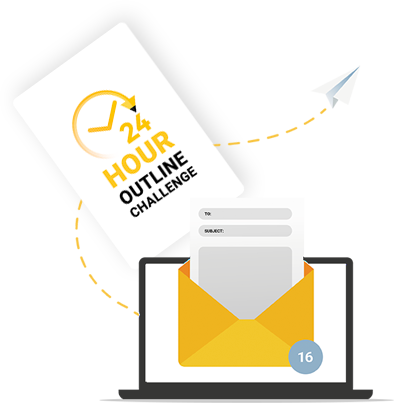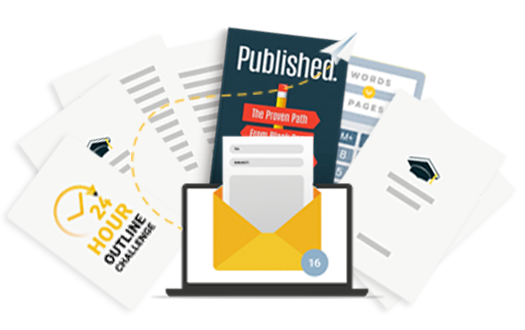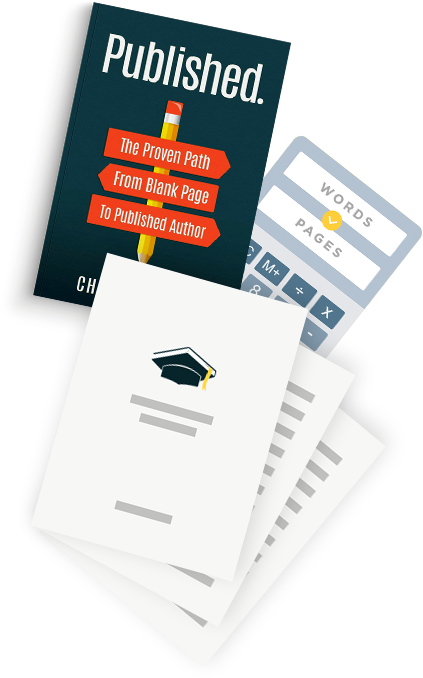The decision to choose a pen name is a highly individual one arrived at after carefully considering many factors.
A previous article on Self Publishing School discussed the many benefits a pen name affords the writer. These included: personal anonymity, strategic branding, and genre-hopping, among others.
This article discusses how to choose a pen name. As the world of book publication gets more competitive – and, particularly in the digital self-publishing arena where writers virtually anywhere in the world can publish their own works across many genres – choosing a pen name (or pseudonym) will become a more common and important thing to consider for effective branding and marketing purposes.
Here are five useful questions to help you learn how to choose a pen name:
- Is a pen name necessary when other authors have used your real name?
- How “old” is your pen name, figuratively speaking? Are you known enough already?
- For very distinct ethnic book genres and categories, does your pen name have to be culturally relevant?
- Is the domain name available for the pen name you are deciding to use?
- Do you have a corresponding book title and cover art in mind for your pen name?
- Bonus – How to use pen name generators
Thanks to many wonderful advances in technology the process of writing a book is now virtually in the hands of the creator – you, the aspiring author. From the initial idea to publish a book to the polished final copy, just about everything in between is now in your hands.
Whether or not you “qualify” for a pen name is no different. It is your judgment call. You do not want to sacrifice originality and creativity for practicality and vice versa.
Remember, no perfect name exists – just as no perfect title or book cover art exists. Like with most stages of the book writing process, the goal is to build momentum, stick to your writing schedule, and reach the finish line: a fully realized manuscript.
Is a pen name necessary when other authors have used your real name?
There are as many name combinations out there as much as there are potential book titles. But while book titles likely span endless word combinations author names are a bit more limited. This is where you will have to be practical and creative.
On Youtube, the second largest search engine in the world and certainly a powerful marketing tool for writers and content creators, three Youtube channels already have my name, “Gabe Muniz.” Another channel exists under my “full name,” “Gabriel Muniz.”
If I was to release a book right now and wanted to reach a bigger audience and expand by books publicity through various creative vlogs, etc. I would likely have to reconsider using my real name.
But here’s the thing: what is true for one major social media platform may not be true for an immensely important commercial website. Enter Amazon, one of the most popular book purchasing websites in the world. On Amazon, my name was virtually unheard of. A grand total of four products came up – none of them books and none with my name.
Publishing a book on Amazon with my real name would seem to be a safe – even commercially viable – option. Not so much with Youtube. This is where having a blog with a creative name that encompasses your brand/message/passion/niche comes in. I could easily use the name of my blog on Youtube and promote my book (written with my real name) on Youtube and elsewhere.
Here are some scenarios where it may be wise to use a pen name in place of your real name:
- Do you share a first and last name with somebody famous in the publishing world? Is your name John Grisham, James Patterson, etc?
- Is your birth name quite long and difficult to pronounce? Do you have a nickname that you go by that is both easy to remember and spell? Remember, your name will be searched online and elsewhere so the easier it is to find the better for you.
- Is personal privacy a big deal to you? Do you want to “test the waters” before jumping right in? Is what you are writing about too “steamy?” Pen names allow you to keep your public and private worlds separate.
- Do you simply want to get started now under a fake name and once you have built up the knowledge and experience to begin to write under your real name?
How “old” is your pen name, figuratively speaking? Are you known enough already?
Nobody really thinks of names as having a certain “age.” Names, in the popular mind, are timeless – they simply are or are not. Some are more popular than others, sure. But older?
According to Dave Chesson, a popular blogger and E-book marketer, yes, names – and especially pen names – do, in fact, “give off” a certain age feel.
Dave gives the example of an instructional book that is written by a younger-sounding name. A potential reader would likely not pick up a book written by somebody who simply sounds younger. Instead, that same reader would be more inclined to read a book written by someone with a more mature authoritative name.
Think of the many textbooks you have seen over the years. They all seem to have authoritative-sounding names followed by specific educational distinctions – Ph.D., M.D., J.D., etc. Now, of course, you cannot “fake it to make it” and include such titles after your name if you don’t possess the level of education. The point is simply that an author’s name should ideally match the seriousness or lightheartedness of the book’s content.
So in this case, the opposite can, in fact, be true. Say you are a practicing doctor or lawyer and you have been dying to delve into your true passion of writing a suspense-themed novel or children’s fantasy book, an official title after your name may not be needed in these cases.
The key is for your name to tap into your reader demographic. There are many creative ways this can happen. Say, you are a millennial, and you regularly blog about millennials-related themes on your popular blog titled, “Millenial Mania.” You even have a growing podcast under the same name.
If up to this point you haven’t released your real name for privacy reasons – this is your after-work passion up to this point – you may want to publish a book under a younger more relatable name that is also catchy and memorable: “Eddy Z,” for instance, or something to that effect.
Consider the Youtube legend himself: Pewdiepie. That’s not only his “stage name,” but his “pen name.” He used it to write his popular book, “This Book Loves You.” If your “stage name” really takes off like his why not cross-brand it?
Last note: there are helpful tools out there to help with coming up with a pen name from a certain era. You can, for instance, get lists of the most common names on year by year basis with a very helpful tool. More on that later.
For very distinct ethnic book genres and categories, does your pen name have to be culturally relevant?
Ethnic-themed books, autobiographies, and memoirs by authors sharing intimate aspects of their particular life experiences and culture are typically written exclusively by “ethnic” authors. That does not mean, however, that these books are read exclusively by “ethnic” readers.
One of my favorite books in high school was the popular memoir, “When I was Puerto Rican,” which detailed a young woman’s journey from Puerto Rico to the United States. The book dealt with the struggles of assimilation, being a bilingual Latina in a foreign culture, various rites of passage, etc. It was a popular book that won significant acclaim and launched the author’s career.
Now could a non-Latino person pull off the same thing under a more American-sounding name? For a deeply personal biographical account, I would say no for obvious reasons–they haven’t lived that life. Now for a fictional account – for somebody very versed in the culture, language, etc., they may be able to pull it off. But even then a slight name change would be better. (Instead of John, how about the Spanish-equivalent Juan?)
However, say a non-Latino professor of sociology has spent the last twenty years studying urban issues within a city environment where a high concentration of a minority ethnic group lives? Can he publish that book? Yes.
“When a Heart Turns Rock Solid,” a book by Timothy Black who is in fact a Sociology Professor, is one such book. No need for a pen name in his case because his knowledge and expertise speaks for itself. Also, notice the strong bold title. The book sounds fictional, almost fantasy-like, but it is, in fact, a powerful biographical account of three brothers struggling with the plight of urban poverty.
Granted, not everyone has PhD level expertise in a subject. And, frankly, there are many more people who have strong passions for things outside of their birth ethnicity and culture. Think of cookbooks and anime as two examples. Pen names may or may not be necessary.
One search on Amazon for Chinese cookbooks reveals an interesting pattern: most of the search results feature Asian names. Not too surprising.
But what if you aren’t Asian, have a passion for Chinese food, and believe you have what it takes to publish the latest cookbook? This is where expertise and creativity again comes in. While you may not need a complete name overhaul, you will want to showcase that you are both knowledgeable and respectful about the culture you are writing about – be it a cookbook, biography, etc.
A pre-existing platform that demonstrates your passion and credibility is always useful. Real-life experiences also help (Say you lived abroad for years, documented your experiences, etc.) Always be mindful of pre-existing audiences and ensure that you are delivering at the same level of quality they are used to.
Is the domain name available for the pen name you are deciding to use?
“Joe Johnson,” not your real name but the pen name you have decided to use after considering the various tips you’ve learned through reading this article, is now the name attached to your surprise bestseller. What do you do?
If you are lucky, you may find that no domain name exists under that particular name. This means you can create a website under that name and, in doing so, create a marketing platform that features your future work.
Ideally, you want to purchase your pen name’s domain prior to your book’s release. The first thing you want to do, then, when considering a pen name is to see if a domain is available.
Consider what happens if you do not purchase the domain name of a pen name that suddenly is associated with a popular book. For one thing, someone else can purchase the domain and redirect traffic to their site instead of your own resulting in a loss of many would-be opportunities for broader brand exposure, increased readership, speaking engagements, etc.
You can check to see if a domain name is available on many popular web hosting sites like siteground.com. Try it here.
Do you have a corresponding book title and cover art in mind for your pen name?
If you look at major authors with long-established records, you notice that their names are placed prominently on the books cover either above or below the title. This should not be the case for the beginning writer with no real track record or pre-existing audience. It may be better to emphasize the title – especially a catchy, hard-hitting title – and the cover art to really “grab” the reader’s attention.
Don’t ever underestimate the importance of the cover. As Seth Godin, popular author and marketing genius once stated in a popular blog post: “Tactically, the cover sells the back cover, the back cover sells the flap and by then you’ve sold the book.”
In other words, the catchy nature, original quality, and even bold controversial naming of your book, corresponding cover art, and elevator pitch-like description, when combined, represent your “sales pitch” to your potential reading audience. You gotta hook ‘em.
How to use pen name generators
As one blogger put it, picking a pen name is harder than coming up with a baby name. Think about it: picking a name for a child is just that – a name, one name. A pen name requires that you decide upon a first and last name, a process that is even more complicated if you want to connote a certain age, reach a particular audience, emphasize a certain ethnicity, etc.
Pen name generators are a helpful way to make this process a bit easier. Thankfully, too, many specific pen name generators exist for different types of genres – everything from horror to Victorian.
Probably the most popular and comprehensive of these name generators is fakenamegenerator.com. This site enables the user to create not only a fake name but a completely fake persona, including address, phone number, occupation, place of work, etc. You can customize the settings to take into account age, gender, and ethnicity. These options not only help with pen name creation but with fictional character development.
Give it a shot here.
In Dave Chesson’s helpful article he provides various other pen name generators that are more genre-specific. These include:
- Namegenerator.org.uk : On this site, you are asked various questions – many of them random and unrelated – to come up with a variety of pen names
- Fantasynamegenerators.com : for odd, awkward, and fun names, this is your place to go. Interested in something more classy and historical? They have a special focus on Victorian-era names too.
- Namegeneratorfun.com : want something edgy and cool? This is the place to go.
- Seventhsanctum.com : As their tagline makes clear: “Evil names for all your evil naming needs as you may have needed to name evilly. For evil.” A great resource for coming up with names for villains.
Picking a name that is the “Right Age?”
There are also great resources for coming up with age-specific names. Babyresource.com, the world’s largest digital parenting resource, provides some helpful lists of the most common names by year. Simply go to Google and type in, “Top baby names for 1990 Baby Center.”
Click here for the results for 1990. Now for 100 years further back – 1900 – click here. The results are very interesting and telling of the changing cultural influences. Indeed, names evoke a historical time period and context. Give it a try. See what year, if any at all, your name appears in.
Self-published books have many moving parts to them, each with varying levels of strategic marketing importance. A carefully chosen pen name is one such critical component. By now, your creative juices should be flowing. As with most things involving the sometimes tedious writing process you can revise and edit accordingly. Have fun.



